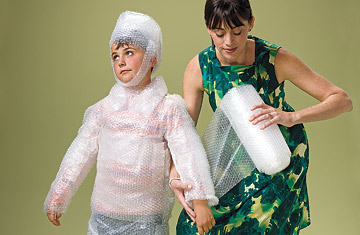
(6 of 8)
Other studies reinforce the importance of play as an essential protein in a child's emotional diet; were it not, argue some scientists, it would not have persisted across species and millenniums, perhaps as a way to practice for adulthood, to build leadership, sociability, flexibility, resilience--even as a means of literally shaping the brain and its pathways. Dr. Stuart Brown, a psychiatrist and the founder of the National Institute for Play--who has a treehouse above his office--recalls in a recent book how managers at Caltech's Jet Propulsion Laboratory (JPL) noticed the younger engineers lacked problem-solving skills, though they had top grades and test scores. Realizing the older engineers had more play experience as kids--they'd taken apart clocks, built stereos, made models--JPL eventually incorporated questions about job applicants' play backgrounds into interviews. "If you look at what produces learning and memory and well-being" in life, Brown has argued, "play is as fundamental as any other aspect.'' The American Academy of Pediatrics warns that the decrease in free playtime could carry health risks: "For some children, this hurried lifestyle is a source of stress and anxiety and may even contribute to depression." Not to mention the epidemic of childhood obesity in a generation of kids who never just go out and play.
Remember, Mistakes Are Good
Many educators have been searching for ways to tell parents when to back off. It's a tricky line to walk, since studies link parents' engagement in a child's education to better grades, higher test scores, less substance abuse and better college outcomes. Given a choice, teachers say, overinvolved parents are preferable to invisible ones. The challenge is helping parents know when they are crossing a line.
Every teacher can tell the story of a student who needed to fail in order to be reassured that the world wouldn't come to an end. Yet teachers now face a climate in which parents ghostwrite students' homework, airbrush their lab reports--then lobby like a K Street hired gun for their child to be assigned to certain classes. Principal Karen Faucher instituted a "no rescue" policy at Belinder Elementary in Prairie Village, Kans., when she noticed the front-office table covered each day with forgotten lunch boxes and notebooks, all brought in by parents. The tipping point was the day a mom rushed in with a necklace meant to complete her daughter's coordinated outfit. "I'm lucky--I deal with intelligent parents here," Faucher says. "But you saw very intelligent parents doing very stupid things. It was almost like a virus. The parents knew that was not what they intended to do, but they couldn't help themselves." A guidance counselor at a Washington prep school urges parents to find a mentor of a certain disposition. "Make friends with parents," she advises, "who don't think their kids are perfect." Or with parents who are willing to exert some peer pressure of their own: when schools debate whether to drop recess to free up more test-prep time, parents need to let a school know if they think that's a trade-off worth making.
